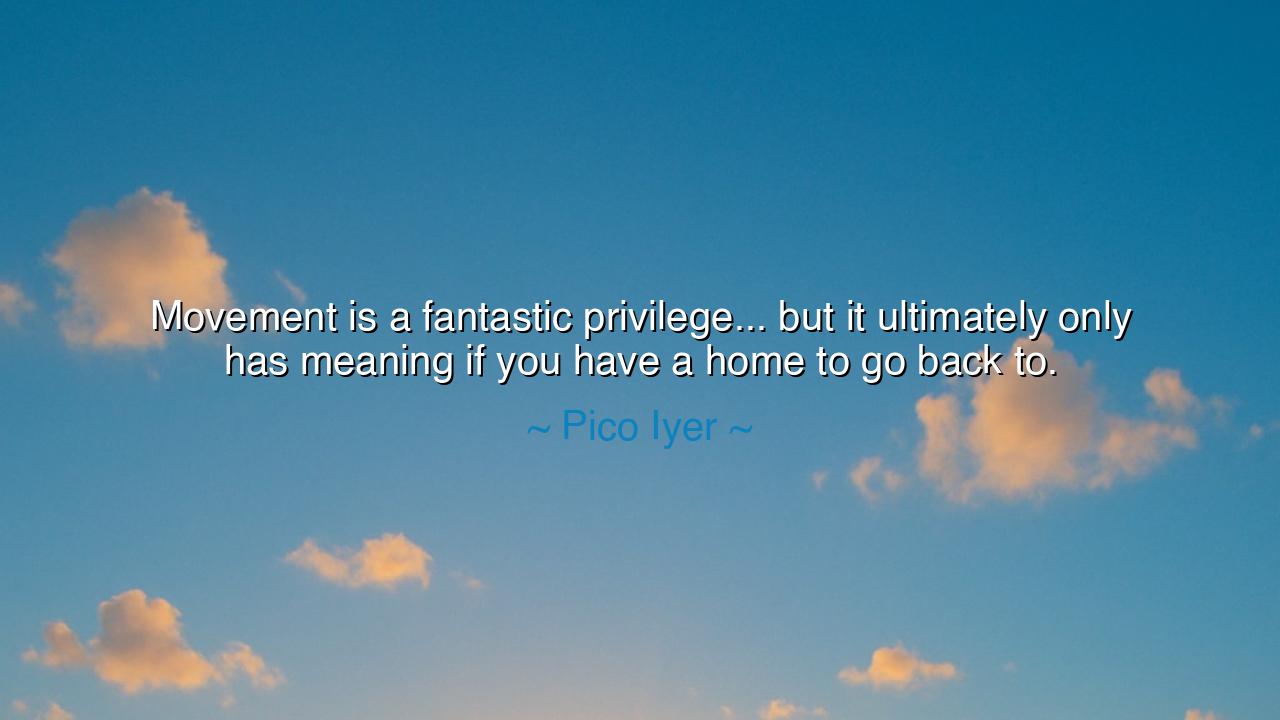
Movement is a fantastic privilege... but it ultimately only has
Movement is a fantastic privilege... but it ultimately only has meaning if you have a home to go back to.






In the twilight of thought, where wanderers and dreamers meet, there arises a truth spoken softly yet echoing through eternity: “Movement is a fantastic privilege... but it ultimately only has meaning if you have a home to go back to.” In these words, Pico Iyer, the pilgrim of the modern age, unveils a paradox older than empires — that the soul hungers for both freedom and belonging. The traveler’s joy, radiant as dawn, finds its shadow in the longing for return. For what is movement, if not the art of leaving and the hope of coming back? The ancients would have called it the dance of the spirit — the eternal rhythm between wandering and rooting, between the road and the hearth.
In Iyer’s reflection lies the wisdom of the ages: movement without home is mere drifting, a journey without anchor or end. To move is to breathe, to grow, to taste the infinite. Yet even the stars, in their eternal motion, revolve around unseen centers of gravity. So too must the human heart find its center, its home — not always a place, but often a presence, a belonging, a truth to which it returns when the world grows vast and strange. Without such an anchor, movement becomes exile; with it, every voyage becomes pilgrimage.
Consider the tale of Odysseus, the wanderer of Ithaca, whose heart carried both the thrill of the sea and the ache for return. Ten years he roamed the waters, tasted the honey of adventure and the salt of loss. Yet through it all, his spirit bent toward home — toward Penelope, toward the olive tree that rooted his identity in the soil of memory. His journey became legend not because he traveled far, but because he came back changed. It was the act of returning that gave meaning to his wandering, as the shore gives meaning to the tide.
Movement, as Iyer tells us, is a privilege — a song of liberty that few in the long scroll of history have truly known. To cross oceans, to touch many skies, to live as a citizen of the world — these are blessings. But blessings ungrounded become illusions. The wise traveler knows that every departure must be balanced by return — not always to the same roof or street, but to the essence of home that dwells within. For home is not merely stone and wood; it is where our soul is recognized, where our heart may rest and remember itself.
History gives us another witness: Siddhartha, the one who became the Buddha. He left his palace, his wife, his child, in search of enlightenment. For years he wandered forests, seeking truth in the stillness of the wild. But even in his awakening beneath the Bodhi tree, his journey was not complete until he returned — not to his palace, but to his people. His return was his fulfillment, for wisdom finds its true power not in isolation, but in communion. Thus, even the most sacred movement must circle back to home — to compassion, to connection, to the ground that nurtured its birth.
In this way, Iyer reminds us that movement is not escape, but exploration; not abandonment, but expansion. To move is to know the world; to return is to know oneself. The bird that soars without rest forgets the shape of its nest; the traveler who never pauses forgets the sound of his own name. True freedom, then, is not in endless wandering, but in the harmony between the road and the hearth, between the journey outward and the journey within.
Let this be the teaching carved upon the walls of your heart: Seek not endless motion, but meaningful motion. Move, yes — cross boundaries, learn tongues, embrace strangeness — but always carry with you a home of spirit, a place of stillness amid the noise. Whether it is a person, a purpose, or a sacred space of your own making, let it be your compass when the winds of the world scatter your direction.
And when you grow weary from the journey — when the world’s colors blur and its songs grow faint — do not curse the longing that draws you back. That longing is holy. It is the whisper of your roots calling you home. For movement gains its beauty from return, and home gains its meaning from departure. Thus the cycle completes — as it always has, as it always will — the eternal rhythm of the human heart.






AAdministratorAdministrator
Welcome, honored guests. Please leave a comment, we will respond soon